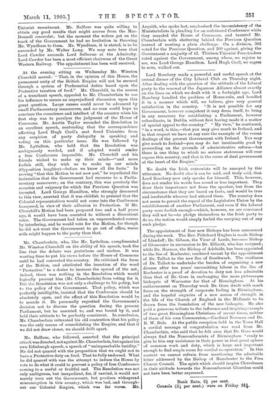Mr. Balfour, who followed, asserted that the principal attack was
directed, not against Mr. Chamberlain, but against his own Edinburgh speech, a speech of " unimpeachable lucidity." He did not quarrel with the proposition that we ought not to have a Protective duty on food. That he fully endorsed. What he did quarrel with was the attempt to induce the House by vote to do what it could to prevent a policy of free Conference coming to a useful or fruitful end. The Resolution was not only ambiguous, but inexpedient, for, if carried, it would not merely turn out the Government, but produce widespread misconception in this country, which was bad, and through- out our Colonial Empire, which was far worse. Mr. Asquith, who spoke last, emphasised the inconsistency of the Ministerialists in pleading for an unfettered Conference while they muzzled the House of Commons, and taunted Mr. Chamberlain with sheltering behind the Previous Question instead of meeting a plain challenge. On a division, 302 voted for the Previous Question, and 260 against, giving the Government a majority of 42. Thirteen Unionist Free-traders voted against the Government, among whom, we rejoice to see, was Lord George Hamilton. Lord Hugh Cecil, we regret to note, walked out.










































 Previous page
Previous page